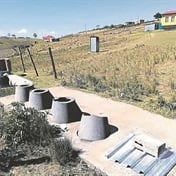
Gauteng Premier David Makhura has only been serving in the executive for one year, but speaks with authority and precision about the gap that frustrates him and the people of this province – and this is that civil servants do not understand “we serve people who are increasingly becoming impatient with the slow pace of change”.
He worries about institutional and bureaucratic logjams that still remain in the system.
“If there is something I was not aware of [before I joined government], it is the battle you have to put up to ensure the machine of government moves with efficiency. Government bureaucracy can be frustrating in how slow things get done.
“Some of the critical things we have to get our officials to understand is that communities are becoming impatient at the slow pace of response. We take too long to get things done.”
Makhura (47) says the state needs to transform to ensure it is responsive and builds trust with the people it serves.
“Twenty-one years into democracy and we still have a lot of lethargy in administration.
“Some civil servants look at you when you come into government and say: ‘This one will run out of energy.’ Civil servants sometimes think politicians will come and go, and will leave them there.”
Makhura’s experiences of bureaucratic foot-dragging include plans that should have been implemented in six months taking almost a year to effect.
“But I will not run out of energy. They must ask the people I worked with at the ANC for almost 15 years.”
He is proud that in the 12 months since he took office, the number of service-delivery protests has dwindled and the hot spots or no-go areas in the province have been stabilised.
Makhura attributes this to the service-delivery war room he has created. It is a high-level, rapid-response team that monitors areas where there are likely to be protests over service delivery, and intervenes before the protest marches even take place.
He says many protests did not happen because the team intervened. “Remember that the first thing people want is a government response rather than a march.
“And people are reasonable. So we are able to talk to them. If, for example, they say they want a clinic and we say: ‘You cannot get the clinic you want now even if you march, but you will get it in a year or so.’”
Makhura says he runs an “activist” Cabinet and his MECs are expected to be on the ground, responding to every issue in their line of work.
He says many Gauteng residents identify corruption as a threat to service delivery.
His interventions here include enforcing an open tender system. “Anyone can walk into a room where a tender is being adjudicated and can see for themselves how decisions are taken.”
Makhura says he is on course to resolve the endemic problems with the Gauteng health department. The first achievement this month was that the running of the department was restored to Gauteng after it was placed under national administration for years.
“We no longer have the institutional problem of suppliers not being paid on time,” he says.
He is also eliminating the problem of underspending, after the infrastructure department spent 99% of its budget.
In the next three weeks, he plans to announce major plans on how to source power that will mitigate load shedding in the province.
After his election last year, Makhura inspired hope by promising to review the impact of e-tolls. Many interpreted this as a sign that he would repeal the system.
But working with Deputy President Cyril Ramaphosa and the national transport department, what he delivered was a compromise that offered substantially reduced tariffs for motorists, but with the e-toll system still remaining in place.
“The question of whether everybody is satisfied or not is another matter, but we will continue to engage and intervene on behalf of the people.”
Makhura, who has decided not to occupy the provincial state house used by his predecessors, lives with his family in Midrand.
He says there is pressure on him to succeed.
“If Gauteng does not work or is polarised, it affects 25% of the population of this country and 36% of the economy, and South Africa will be negatively affected.”
On national matters, particularly Nkandla, Makhura believes the controversial report presented by Police Minister Nathi Nhleko in Parliament has reopened a matter that was moving towards resolution.
Nhleko concluded that a chicken run, cattle culvert and a swimming pool were all security features at Nkandla and government should spend more to conclude the security work.
Makhura felt the report of the Public Protector and Parliament’s ad hoc committee had followed a process that was going to adequately address this matter, but the Nhleko report had reversed this.
“One was expecting we had gone past an issue like that, but now it is wide open,” he says.




 Publications
Publications
 Partners
Partners








